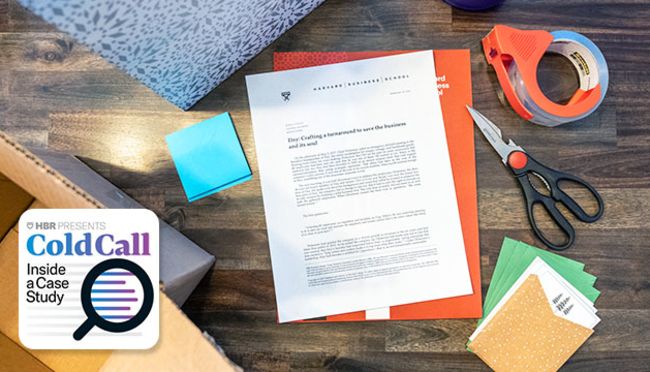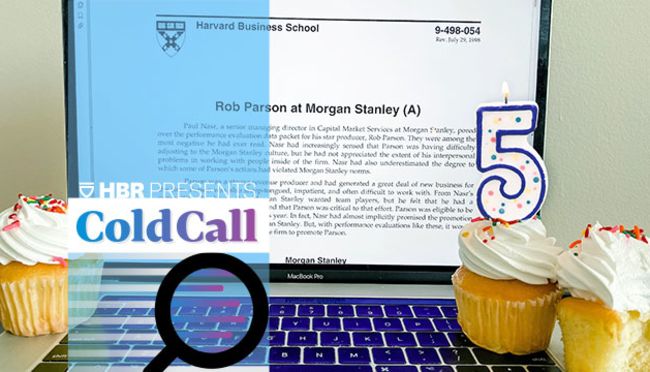Performance →
→

- 02 Jan 2024
- What Do You Think?
Do Boomerang CEOs Get a Bad Rap?
Several companies have brought back formerly successful CEOs in hopes of breathing new life into their organizations—with mixed results. But are we even measuring the boomerang CEOs' performance properly? asks James Heskett. Open for comment; 0 Comments.

- 22 Nov 2023
- Research & Ideas
Humans vs. Machines: Untangling the Tasks AI Can (and Can't) Handle
Are you a centaur or a cyborg? A study of 750 consultants sheds new light on the strengths and limits of ChatGPT, and what it takes to operationalize generative AI. Research by Edward McFowland III, Karim Lakhani, Fabrizio Dell'Acqua, and colleagues.

- 06 Oct 2023
- Book
Yes, You Can Radically Change Your Organization in One Week
Skip the committees and the multi-year roadmap. With the right conditions, leaders can confront even complex organizational problems in one week. Frances Frei and Anne Morriss explain how in their book Move Fast and Fix Things.

- 28 Aug 2023
- Research & Ideas
The Clock Is Ticking: 3 Ways to Manage Your Time Better
Life is short. Are you using your time wisely? Leslie Perlow, Arthur Brooks, and DJ DiDonna offer time management advice to help you work smarter and live happier.

- 08 Aug 2023
- Research & Ideas
The Rise of Employee Analytics: Productivity Dream or Micromanagement Nightmare?
"People analytics"—using employee data to make management decisions—could soon transform the workplace and hiring, but implementation will be critical, says Jeffrey Polzer. After all, do managers really need to know about employees' every keystroke?

- 01 Aug 2023
- What Do You Think?
As Leaders, Why Do We Continue to Reward A, While Hoping for B?
Companies often encourage the bad behavior that executives publicly rebuke—usually in pursuit of short-term performance. What keeps leaders from truly aligning incentives and goals? asks James Heskett. Open for comment; 0 Comments.

- 14 Jun 2023
- Research & Ideas
Four Steps to Building the Psychological Safety That High-Performing Teams Need
Struggling to spark strategic risk-taking and creative thinking? In the post-pandemic workplace, teams need psychological safety more than ever, and a new analysis by Amy Edmondson highlights the best ways to nurture it.

- 05 Jun 2023
- What Do You Think?
Is the Anxious Achiever a Post-Pandemic Relic?
Achievement has been a salve for self-doubt for many generations. But many of the oldest members of Gen Z, who came of age amid COVID-19, think differently about the value of work. Will they forge a new leadership style? wonders James Heskett. Open for comment; 0 Comments.

- 27 Feb 2023
- Research & Ideas
How One Late Employee Can Hurt Your Business: Data from 25 Million Timecards
Employees who clock in a few minutes late—or not at all—often dampen sales and productivity, says a study of 100,000 workers by Ananth Raman and Caleb Kwon. What can managers do to address chronic tardiness and absenteeism?

- 01 Feb 2023
- What Do You Think?
Will Hybrid Work Strategies Pull Down Long-Term Performance?
Many academics consider remote and hybrid work the future, but some business leaders are pushing back. Can colleagues working from anywhere still create the special glue that bonds teams together? asks James Heskett. Open for comment; 0 Comments.

- 23 Aug 2022
- Cold Call Podcast
Management Lessons from the Sinking of the SS El Faro
Captain Michael Davidson of the container ship SS El Faro was determined to make his planned shipping trip on time—but a hurricane was approaching his intended path. To succeed, Davidson and his fellow officers had to plot a course to avoid the storm in the face of conflicting weather reports from multiple sources and differing opinions among the officers about what to do. Over the 36-hour voyage, tensions rose as the ship got closer and closer to the storm. And there were other factors compounding the challenge. The El Faro was an old ship, about to be scrapped. Its owner, TOTE Maritime, was in the process of selecting officers to crew its new ships. Davidson and some of his officers knew the company measured a ship’s on-time arrival and factored that into performance reviews and hiring decisions. When the ship ultimately sunk on October 1, 2015, it was the deadliest American shipping disaster in decades. But who was to blame for the tragedy and what can we learn from it? Professor Joe Fuller discusses the culpability of the captain, as well as his subordinates, and what it reveals about how leaders and their teams communicate under pressure in his case, "Into the Raging Sea: Final Voyage of the SS El Faro."

- 01 Aug 2022
- What Do You Think?
Does Religious Belief Affect Organizational Performance?
Chinese firms exposed to Confucianism outperformed peers and contributed more to their communities, says a recent study. James Heskett considers whether the role of religion in management merits further research. Open for comment; 0 Comments.

- 22 Mar 2022
- Cold Call Podcast
How Etsy Found Its Purpose and Crafted a Turnaround
Etsy, the online seller of handmade goods, was founded in 2005 as an alternative to companies that sold mass-manufactured products. The company grew substantially, but remained unprofitable under the leadership of two early CEOs. Ten years later, Etsy went public and was forced into a new arena, where it was beholden to stakeholders who demanded financial success and accountability. Unable to contain costs, the company was almost bought out by private equity firms in 2017—until CEO Josh Silverman arrived with a mission to save the company financially and, in the process, save its soul. Harvard Business School professor Ranjay Gulati discusses the purpose-driven turnaround Silverman and his team led at Etsy—to make the company profitable and improve its social and environmental impact—in the case, “Etsy: Crafting a Turnaround to Save the Business and Its Soul.” Open for comment; 0 Comments.

- 09 Nov 2021
- Research & Ideas
The Simple Secret of Effective Mentoring Programs
The employees who need guidance most rarely seek it out. New research by Christopher Stanton sheds light on what companies stand to gain from mentorship programs that include everyone. Open for comment; 0 Comments.

- 22 Oct 2021
- Research & Ideas
Want Hybrid Work to Succeed? Trust, Don’t Track, Employees
Many companies want employees back at desks, but workers want more flexibility than ever. Tsedal Neeley offers three rules for senior managers trying to forge a new hybrid path. Open for comment; 0 Comments.

- 13 Jul 2021
- Cold Call Podcast
Strategies for Underdogs: How Alibaba’s Taobao Beat eBay in China
In 2007, Alibaba’s Taobao became China’s leading consumer e-commerce marketplace, displacing the once dominant eBay. How did underdog Taobao do it? And will it be able to find a way to monetize its marketplace and ensure future success? Professor Felix Oberholzer-Gee discusses his case, “Alibaba’s Taobao,” and related strategy lessons from his new book, Better, Simpler Strategy: A Value-Based Guide to Exceptional Performance. Open for comment; 0 Comments.

- 20 Oct 2020
- Sharpening Your Skills
Steps to Help You Get Out of Your Own Way
These research-based tips will help you slow down, fight the fog, and improve both your home life and work life. Open for comment; 0 Comments.

- 08 Oct 2020
- Research & Ideas
Keep Your Weary Workers Engaged and Motivated
Humans are motivated by four drives: acquire, bond, comprehend, and defend. Boris Groysberg and Robin Abrahams discuss how managers can use all four to keep employees engaged. Open for comment; 0 Comments.

- 29 Sep 2020
- Cold Call Podcast
Employee Performance vs. Company Values: A Manager’s Dilemma
The Cold Call podcast celebrate its five-year anniversary with a classic case study. Harvard Business School Dean Nitin Nohria discusses the dilemma of how to treat a brilliant individual performer who can't work with colleagues. Open for comment; 0 Comments.

Employees Out Sick? Inside One Company's Creative Approach to Staying Productive
Regular absenteeism can hobble output and even bring down a business. But fostering a collaborative culture that brings managers together can help companies weather surges of sick days and no-shows. Research by Jorge Tamayo shows how.